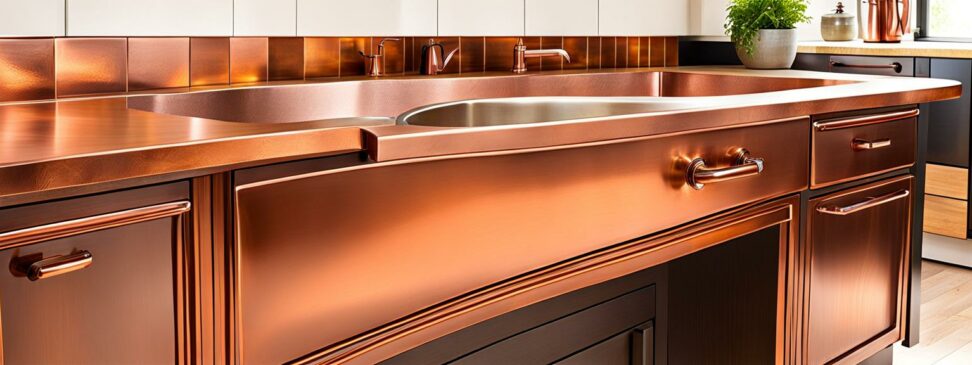Install Vintage Inspired Copper for Farmhouse Kitchen Sinks
Copper sinks exude a sense of warmth and antiquity that can elevate kitchen design. Their distinctive vintage styling makes copper an ideal choice for achieving the rustic farmhouse aesthetic.
With natural antibacterial properties, attractive patina development, and excellent heat conductivity, copper brings functionality as well as form. By installing a copper apron-front or other farmhouse sink, you can add a focal point that feels pleasantly nostalgic.

The Draw of Farmhouse Style
Farmhouse kitchens merge practicality and charm for a comforting, rural feel. This perpetually popular look contains signature elements like exposed beams, ample cabinetry, and vivid accent colors against white backdrops.
At the heart of the farmhouse kitchen is the farmhouse-style sink. With a deep, wide basin and wrap-around apron front, this icon of vintage Americana suits ornate legs or baseboards. Its front-and-center placement makes it a decor highlight.
Copper's Rustic, Antique Allure
The aged, gentle patina and slightly mottled look of copper can transform a kitchen into a cozy countryside retreat. With their artisanal hammered or smoothed finishes, copper farmhouse sinks feel pleasantly imperfect and decidedly non-modern.
A handsome antique copper sink develops richer hues over years of use. Newer copper brings out the warmth of the material. And copper pairs beautifully with other farmhouse metals like stainless steel and nickel.
Complementing Farmhouse Design
From raw exposed wood to ceramic knobs and checks, copper's earthy qualities fit right in with farmhouse motifs. The metal contributes a welcome texture against wood countertops. And a copper sink anchored by turned wood legs has that hand-hewn appeal.
For a touch of contrast, try pairing copper with crisp white cabinetry, paneled fronts, and marble. Copper also harmonizes with the blues, greens, and yellows typical of farmhouse décor.
Benefits of Copper Kitchen Sinks
Antimicrobial Properties Keep Sinks Safer
Copper naturally kills harmful bacteria, viruses, and fungi upon contact. This antimicrobial effect helps prevent the spread of dangerous pathogens.
Research verifies copper's ability to rapidly inactivate E. coli, salmonella, listeria, and even coronaviruses. Microbes Detected on surfaces made from stainless steel can thrive for weeks.
The EPA has officially approved copper's antibacterial properties. While regular cleaning remains essential, copper adds critical germ-fighting action.
Ideal Heat Conductivity and Retention
Excellent heat conduction is another advantage of copper sinks. Copper quickly absorbs warmth and distributes it evenly across the entire sink.
This allows you to rinse dishes under reliably hot water. Food residue glides off with less effort. And copper retains heat far better than stainless steel.
The consistent spread of heat enables more efficient washing and precise temperature control when tasks like melting butter or making sauces.
Durable, Long-Lasting Material
Copper sinks stand the test of time. The material does not easily scratch, stain, or erode. It also will not rust or corrode like some metals over decades of use.
High-quality copper with sufficient thickness can withstand heavy impacts. And simple upkeep preserves the look and utility of copper over many years.
With their comforting allure and sturdy construction, copper sinks become treasured kitchen fixtures passed between generations.
Choosing Your Farmhouse Copper Sink
Popular Styles and Dimensions
The most iconic farmhouse sinks feature a front apron and slightly rounded corners. Depth is usually under 10 inches, with width ranging from 30 to 36 inches.
Undermount, marble inset, and vessel variations work in more contemporary kitchens. Consider double bowls for multi-tasking. And finishes like hammering or a grid pattern add flair.
Be sure to measure your existing space or consult with designers on ideal sink dimensions. Larger farmhouse sinks allow bigger pots and stack washing.
Reputable Brands to Consider
Quality hand-assembled construction ensures durability and aesthetic appeal. Look for trusted companies like Native Trails, Sinkology, and StoneSmith.
Reading reviews provides insight on longevity, noise levels, and overall owner satisfaction. Many brands offer limited lifetime warranties against defects and workmanship errors.
While budget-friendly options exist, prioritizing quality materials and careful manufacturing will ensure your investment sparkles for decades.
Installing and Caring for Copper Sinks
Professional Installation Recommended
Proper installation prevents leaks and other issues. Most copper sink companies advise hiring an experienced plumber or contractor.
The sink must be evenly supported below. Clips, silicone adhesive, or a custom-built frame all work to solidly secure the sink.
After hooking up supply lines and drainage, the perimeter should be thoroughly caulked. This seals the joint between sink and countertop.
Regular Maintenance Preserves Beauty
While durable, copper requires more frequent cleaning than other sink materials. Use mild detergent and avoid abrasive scrubbers.
An occasional gentle polish with special copper cleaner removes oxidation and restores shine. And resealing every 3-6 months prevents water spots and stains.
Take caution to only use cleaning products specifically designed for use on copper. Harsh chemicals can erode protective finishes.
With their welcoming, vintage styling, copper apron sinks feel like they belong in cozy countryside homes. Beyond looks, copper provides real benefits like fighting germs and conducting heat.
A handsome aged copper sink can serve as the decorative heart of your kitchen for life. Though an investment, this timeless piece brings functionality, luxury, and nostalgic style.